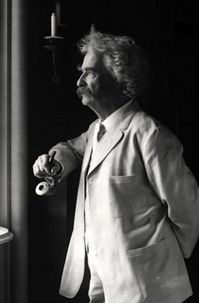Critical Patriotism: Was Mark Twain unpatriotic?

A few years ago, Hal Holbrook brought his one-man show “Mark Twain Tonight” to Ann Arbor. I had high expectations and wasn’t disappointed. Holbrook preceded his entrance on stage with a puff of cigar smoke illuminated in the floodlights. Holbrook became Twain that night, giving insight into Twain the author and the man.
So, when we left the auditorium, I was surprised to hear grumbling from other theatergoers: “Loved Holbrook; hated Twain,” one said. “Twain was just so negative. He hated people.”
True, over time Twain became more and more critical of American foreign polices and even of humanity at large. But I think he did so because he had very high aspirations for the nation (and people) and was outraged at failure to live up its high ideals. He was a critical patriot, one who criticizes the government out of love of country and the desire to have it live up to its ideals.
Twain originally supported American imperialism. He hoped that America could bring democracy and freedom to the Philippines, but soon turned against its annexation when he realized what would actually happen. He felt it was a violation of American ideals.
He became an ardent anti-imperialist and a prominent member of the American Anti-Imperialist League. For the remainder of his life, he opposed both American and European imperialism.
“The War Prayer,” published after his death, is a harsh indictment of war, especially the death and destruction wrought on nations by those who conquer them. Depending on the times, it has been viewed as an unpatriotic story or a patriotic story. “Patriotism is supporting your country all the time,” said Twain, “and your government when it deserves it.”
Care to read Twain’s piece? ReadTheSpirit has the original 1916 text as published in Harper’s Bazaar.
Who is our Mark Twain today?
Was Twain unpatriotic?
Does the government deserve our support?
Wayne Baker is a sociologist on the faculty of the University of Michigan Ross School of Business. Baker blogs daily at Our Values and can be reached at ourvaluesproject@gmail.com or on Facebook.


Comments
kmgeb2000
Wed, Sep 12, 2012 : 6:58 p.m.
1. Jon Stewart - just less eloquant. 2.NO (when can the truth be ever be unpatriotic). 3.Yes, but the detail are in the form of the support. People seem to forget that the Government is the people; to not support Government is akin to cutting out our own heart. J.J.R. Tolken said it best in The Two Towers (1954): "War must be, while we defend our lives against a destroyer who will devour all; but I do not love the fright sword for its sharpness, nor the arrow for its swiftness, nor the warrior for his glory. I love only that which they defend..." By the way, the poem is excellent. It seems to suggest the question can any war be won when one acknowledges the Total Cost of Ownership.
colvina
Wed, Sep 12, 2012 : 4:48 p.m.
Thanks for the link to the War Poem - powerful.